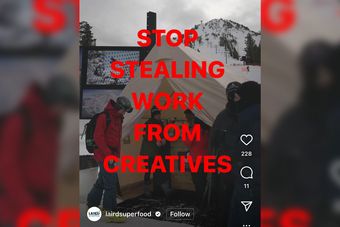The following article appeared on AdAge on February 7, 2022.
Read the original here.

By Brian Bonilla and Parker Herren.
Starch Creative provokes an industry-wide conversation
Brandon Ball, CEO of a small agency called Starch Creative, took to Instagram in late January with an irate post. In it, he claimed that Laird Superfood, an Oregon-based organic coffee and food maker, had appropriated the shop’s work.
Starch said it responded to an unpaid RFP, or request for proposal, under the promise that the brand would pay the agency should it choose to commission the work. Ball said that the client did not choose the agency’s idea. But then Laird Superfood posted to its Instagram an activation it was running at the Toyota U.S. Grand Prix of Snowboard and Freeski at California’s Mammoth Mountain from January 6-8, 2022.
The pop-up included a canvas tent and hot drink bar that bears a striking resemblance, the agency claims, to Starch Creative’s pitch. To prove it, Starch posted on Instagram its concept sketches that depict a safari tent that unfolds and packs up easily from wooden storage crates. The interior houses a bar to serve the client’s plant-based hot chocolate, coffee and creamer.
…
Unpaid vs. Paid RFPs
For agencies, the pitch process can be a damned-if-you-do-and-damned-if-you-don’t situation. Consultants say that if a shop does a pitch for free, the work can’t be stolen. But when agencies are paid for a pitch, the compensation is often too meager.
“Unpaid RFPs by leading marketers is the fairest way to manage the creative agency’s IP,” said Matt Ryan, CEO of Roth Ryan Hayes, an agency search firm. “By not paying, the marketer does not have the right to use the presented material without compensating the agency. Paid RFPs very rarely compensate the agency fairly for the work, and because of that they are even more unfair.” Ryan also admits he has heard of “horror stories” of marketers trying to get “something for nothing.”






